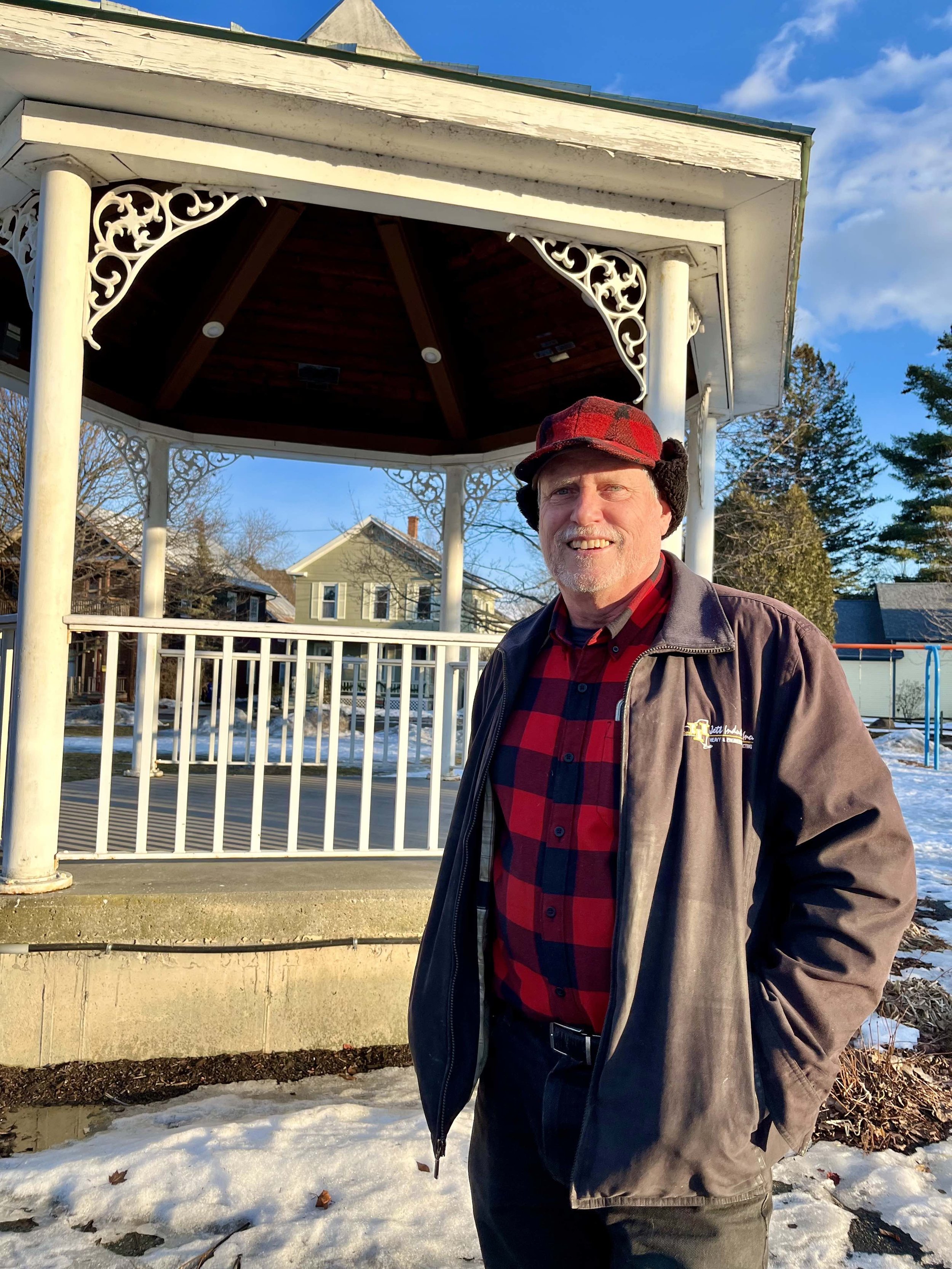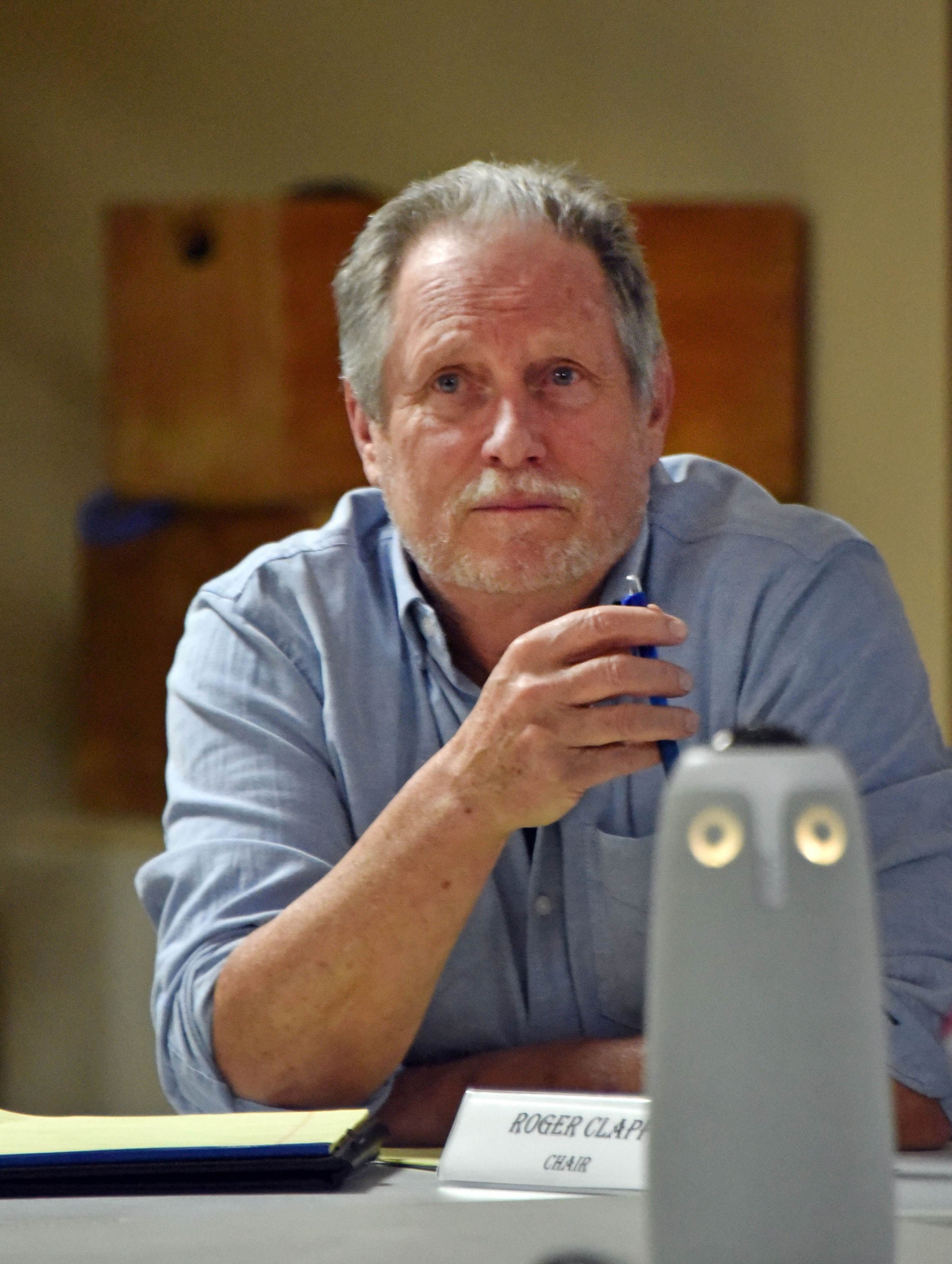Part 2: Unopposed, Clapp eyes a three-year Select Board term
March 2, 2024 | By Sandy Yusen | CorrespondentEditor’s note: This is the second of two candidate profile stories ahead of the Town Meeting Day Waterbury Select Board election. Read Part 1 here.
The spot on the Town Meeting Day ballot for a three-year Waterbury Select Board seat has just one candidate. Unopposed is Roger Clapp, who joined the board in 2022. He first ran as a write-in for a one-year seat and was elected to a second term last year.
Roger Clapp is running unopposed for a three-year term on the Waterbury Select Board. Photo by Sandy Yusen
He’s now seeking the three-year term to succeed Dani Kehlmann who is not running for re-election this year.
Clapp has served as chair for the past two years. The board chooses officers at its first reorganizational meeting following the March 5 election. Clapp will join fellow board members Mike Bard and Alyssa Johnson and the winners of the three-way contest among incumbent Kane Sweeney, Ian Shea and Cheryl Schoolcraft Gloor.
Along with the others on the ballot, Clapp talked with Waterbury Roundabout about serving on the board.
Clapp’s career in international and agricultural development has taken him to far-flung communities around the world. Born and raised in the Boston suburbs, Clapp, 70, attended Tufts University. After college, he spent three years in the Peace Corps teaching English, coordinating community development programs in Central Africa, and with an agricultural research project in northern Cameroon through Michigan State University.
Clapp said he moved to Vermont to learn more about agriculture and opportunities to revitalize Vermont’s working landscape, getting a master's degree at the University of Vermont. After overseas stints in Rwanda and Uganda, he returned to Vermont, joining then-Gov. Howard Dean’s administration as deputy commissioner for agricultural development.
Clapp co-founded the Vermont Fresh Network, and when Dean embarked on his presidential run, he joined the Institute for Sustainable Communities, working primarily in Eastern Europe on democracy development efforts. After six years, he went to work as state director for the March of Dimes, and later at the Himalayan Cataract Project. He now works as associate director at PH International, formerly called Project Harmony, a nonprofit that focuses on global communities, civic engagement, and cross-cultural learning.
Clapp lives in Waterbury with his wife Pam, a fellow former Peace Corps volunteer who preceded him on the Select Board, serving from 2008-2012. Now in college, their two boys both attended Harwood. In addition to coaching his kids in youth sports, Clapp’s local volunteer work includes Waterbury Winterfest where he serves as president.
Roger Clapp (right) on the sidelines of a snow soccer game at Waterbury Winterfest recently. Clapp is president of the Winterfest leadership team. Photo by Gordon Miller
Clapp said he enjoys his role as Select Board chair, running meetings and determining the agenda. “Throughout my life, I’ve had to set up a lot of meetings and I actually enjoy that democratic process,” he said. He recalled experience in the Peace Corps in communities where democracy was new and empowering as people worked together to make decisions about community projects.
Clapp sees a similar democratic process at the town level here in Waterbury. “It’s not party politics. It’s very non-partisan,” he said. Instead, the focus is on developing plans to tackle priority issues such as housing and road repairs. “It’s not so much that I have a particular agenda that I’m trying to push through, I just want to hear what people have to say and come up with the best solution that we can find.”
Clapp said he understands the need to represent a wide range of constituencies and he jokes about how people have come to seek him out given his role. “I’ve actually found a lot more friends since getting on the board. I used to be able to go shopping without being noticed whatsoever, and now people say hi to me all the time,” he said.
With that comes a responsibility to hear varying points of view. “I think that’s healthy,” Clapp said. “I don’t believe in shutting off debate.”
Looking ahead
In his 24 years living in Waterbury, Clapp said he has seen the town evolve, but he still calls it an “up and coming” town that has changed mostly for the better. “When I first got here, there were three restaurants/bars in town,” he muses. “We had Arvad’s, and then right across the street we had The Pub, with nice indoor/outdoor carpeting, and you could either get Bud or Bud Light – you had two choices,” he recounted. “Things have really picked up quite a bit, and so we want to make sure that that continues.”
Waterbury Select Board Chair Roger Clapp at a recent board meeting at the Main Street fire station to discuss the state’s proposal to use the former Vermont National Guard armory as a homeless shelter. The “owl” recording device for streaming meetings is in the foreground. Photo by Gordon Miller
A key challenge the town now faces is the state’s plan to turn the former Vermont National Guard armory into an emergency shelter. He emphasizes that Waterbury can and does support unhoused people. But he recalls learning about the challenges of congregate housing while working at a Boston shelter as a student at Tufts. “I’m concerned about the scale of what they’re proposing,” he said. “I’m concerned about how it’s going to be run, and then also how is this really going to help those individuals as well as I really do not want this to become a mecca for unhoused people expecting services that aren’t here.”
In recent public meetings, local officials and community members have pressed state officials to address how they will navigate citing a shelter in Waterbury where there is no local police force, few mental health professionals and other social services.
A new project on the horizon that Clapp said he sees as a priority is the potential development of an indoor recreation facility. Another focus is flood mitigation.
Clapp’s Randall Street home has been flooded – by Tropical Storm Irene and last July. The December flood came within a foot of his house. He reports that the town is looking at engineering options similar to measures taken by the state in building the State Office Complex. “We’re looking at Randall Street, the downtown area, the entire Winooski corridor as well as Thacher Brook to see what can be done – what do we have funding for, what could we get some initial engineering done for so that we can qualify for more funding,” he said.
Running for a three-year seat this year, rather than a single-year term will afford him a chance to work on these complex and time-consuming issues and projects, Clapp said. “I felt like three years will give me time to figure out how to move and get things done,” he explained.
Overall, Clapp is optimistic about Waterbury’s future. “I think we’re on the right trajectory. I don’t feel like we need to make any hard right or hard left turns. I have a lot of confidence in the people of Waterbury in continuing to move us in the right direction,” he said. “I just feel like it does take a certain amount of coordination and that we can continue to make this a great place to live and show that democracy can work.”
Along the way, Clapp encourages others to get involved, too. “I’m constantly impressed with the quality and quantity of people stepping forward to volunteer to do stuff in this town, serve on committees, take initiatives and move them forward,” he says. “We’ve got opportunities to serve on the tree committee, the conservation committee and others,– so there’s plenty of room for more participation and things to get involved in and really feel like you’re part – and you actually will become more a part – of the community going forward. I’ve found that really rewarding and I think other people will as well.”
Find more Town Meeting Day coverage here including a Waterbury Select Board candidate survey here.



